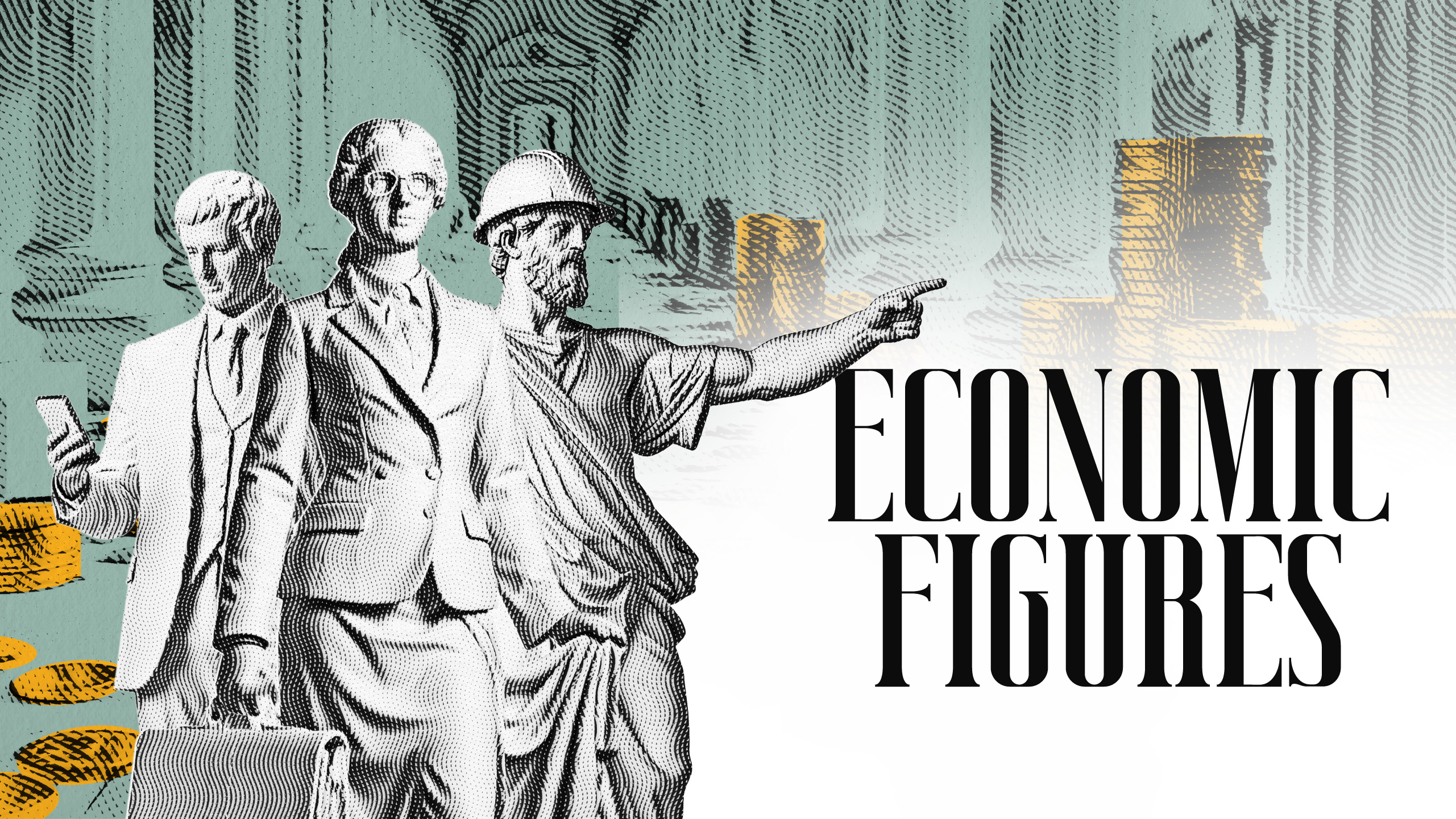Economic Figures

A&M–San Antonio’s alumni, faculty, and staff are driving lasting economic change
By Matt Swenson
Though a relative newcomer to the higher education landscape—having celebrated its 15th anniversary last year—Texas A&M University–San Antonio has already become a powerful economic driver in Bexar County and beyond.
According to a recent economic impact analysis by Lightcast, A&M–San Antonio contributed $292.6 million to the Bexar County economy during fiscal year 2022–23. That’s nearly double the $166.3 million reported in FY 2018–19, highlighting the University’s rapid and substantial growth.
This economic momentum is impressive by any standard. But behind these figures are real people whose efforts and achievements bring the numbers to life. Here we look at some of the individuals helping A&M–San Antonio fuel economic development and improve the region’s quality of life.
Alumni: A Lasting Economic Impact
One of the most significant ways the University supports the economy is through the earning power of its graduates. Lightcast’s report estimates that A&M–San Antonio students will collectively gain $427 million in increased earnings over their careers. In FY 2022–23 alone, alumni generated $181.8 million in additional income for the county while strengthening the regional workforce.
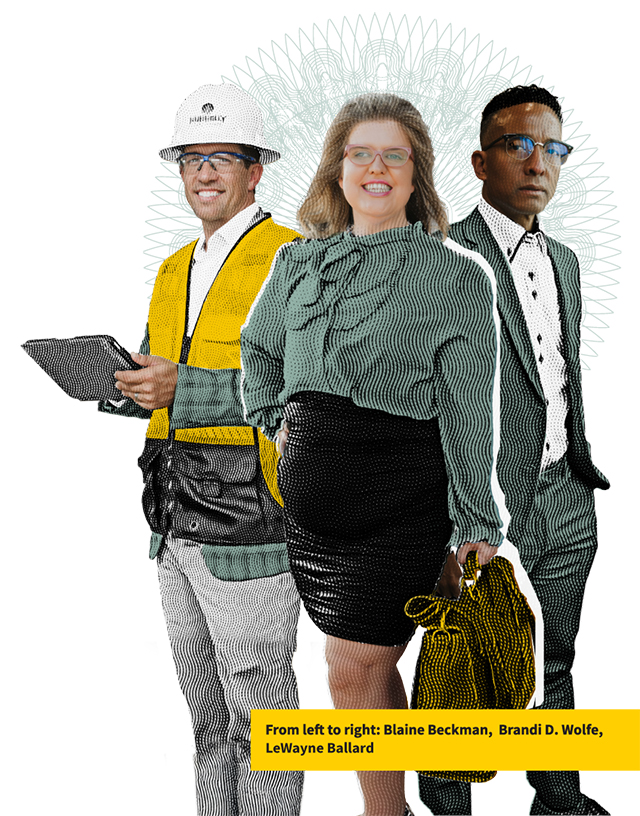
Blaine Beckman, president of South Side-based Nunnelly General Contractor, is one such graduate. After starting his career in construction in Southern California and taking community college courses, Beckman moved to San Antonio in 2007. His wife, Mimi Morrison, encouraged him to enroll at A&M–San Antonio, from which she had graduated in 2011.
Beckman began his studies in 2012 while starting as a project manager at Nunnelly. He earned his bachelor’s degree in business management in 2015 and his MBA in 2017. By 2016, he and partner Greg Vaughn had purchased the company, expanding it from about a dozen employees to over 50. Projects they’ve completed include community centers, performing arts centers, fire and police stations, and the Westside campus expansion of the San Antonio Food Bank.
“I was in the right place at the right time,” said Beckman. “I may not be in ownership at this point if not for A&M-San Antonio.”
Beckman has also been partnering with the University to participate in career fairs and advocating for building a curriculum with an emphasis on construction, which he describes as a high-need industry for San Antonio.
A&M-San Antonio is focused on preparing students for the workforce, and working with alumni like Beckman gives the University valuable insight into what experience students need when they graduate. Beyond strong builders, construction requires marketing, graphic design, and professional organizational experts, he said.
LeWayne Ballard ’13, ’14, another alumnus, entered A&M–San Antonio after a career as a technical engineer. He earned both a bachelor's in computer information systems and an MBA, which helped him rise to become chief technology officer at Linebarger Goggan Blair & Sampson, LLP, a nationwide law firm with over 1,000 employees.
"I don't want it to be a one-way relationship where I go to the school, graduate, move on and never look back. It's important to remember the people, the organization, and the school that helped you." ~LeWayne Ballard
Ballard oversees the firm’s IT operations and has spoken on panels about issues such as artificial intelligence in business. Grateful for the role A&M–San Antonio played in his success, Ballard gives back through donations and outreach.
“I don't want it to be a one-way relationship where I go to the school, graduate, move on and never look back,” said Ballard. “It's important to remember the people, the organization, and the school that helped you.”
Ballard adds it’s been fulfilling to contribute to the San Antonio economy and community since graduating.
“Community is very important for society,” Ballard said. “A community that works together, believes in one another and supports one another will always be the most successful.”
Because many of the University’s students have strong ties to San Antonio -- three-quarters have a permanent address in Bexar County -- A&M-San Antonio’s alumni have a strong commitment to the community. Many graduates are local, lived nearby before enrolling or stay in the community after they graduate, and their contributions are concentrated on the San Antonio region.
Brandi D. Wolfe, a family law attorney, said graduating from A&M-San Antonio with a bachelor’s degree in applied science was critical to starting a second career for both herself and her current husband, Dusty, a former professional wrestler who now is a history professor.
A happy and successful life was hardly a guarantee for Wolfe, who passed on a scholarship to attend West Virginia University to move to Houston with her now-former husband. Emotional and physical abuse filled the marriage, during which Wolfe ran an online marketing firm from home.
Once free from the relationship, Wolfe was inspired to not only get her undergraduate degree at A&M-San Antonio but to go on to law school, from which she graduated in 2020. “I knew that I just wanted to help people,” Wolfe said.
In addition to serving as the founding partner of Brandi Wolfe Law, PLLC, which specializes in divorce and custody battle cases, she runs the Women's Empowerment Legal Center. The domestic violence nonprofit provides free legal services to survivors of domestic violence and handles between 20 and 40 civil cases annually. It also sponsors health and well-being services, such as yoga classes, at abuse victims’ shelters in the region.
Her experience has taught Wolfe how education can be a lifeline for individuals regardless of circumstances. “My answer for everything is to go back to school,” she said. “I feel that education and making that a part of your story and your empowerment and your change is so very important.”
As Wolfe and other alumni illustrate, their impact goes well beyond just numbers and additional income. Their work—be it in the legal profession, technology, or construction—is helping strengthen the community and creating opportunities for others.
"My answer for everything is to go back to school. I feel that education and making that a part of your story and your empowerment and your change is so very important." ~Brandi D. Wolfe
Employees: Lead with purpose—on campus and in the community
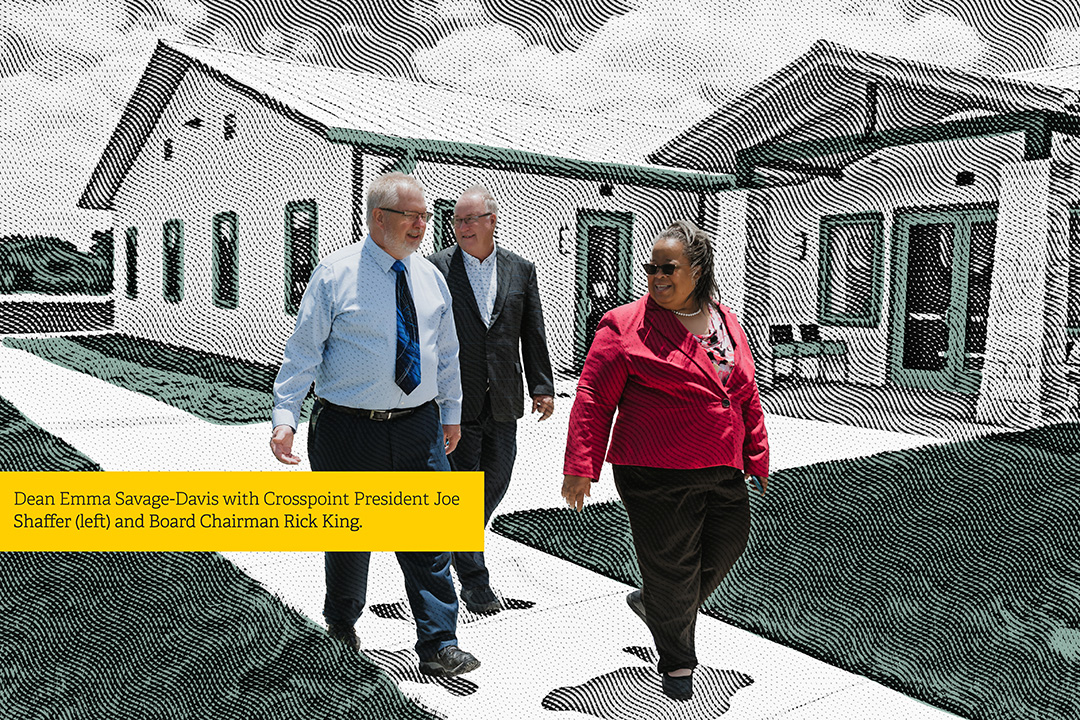
As detailed in its recent economic impact report, A&M–San Antonio spent $68.8 million on payroll for nearly 800 full- and part-time faculty and staff in FY 2022-2023. Much of that income was reinvested in the local economy through everyday spending—just one of the many ways the University contributes to the region. Beyond their roles in higher education, many employees are also involved in community-based organizations that drive meaningful change across San Antonio.
One such leader is Dr. Emma Savage-Davis, who joined A&M–San Antonio in late 2023 as dean of the College of Education and Human Development. She quickly became an active board member of Crosspoint, Inc., a local nonprofit founded in 1963 that serves thousands of veterans, state hospital patients, and formerly incarcerated individuals, as well as people experiencing homelessness or mental illness.
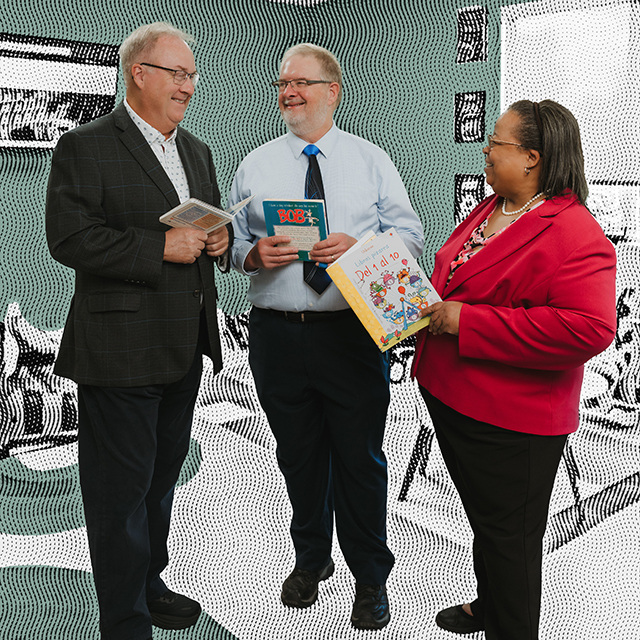
“As a Crosspoint board member, I help advance the organization's mission of providing second chances by leveraging my background in the College of Education and Human Development, where our work is centered on empowering people,” said Savage-Davis. “The academic and professional pathways within the College are deeply rooted in improving lives, strengthening communities and fostering long-term well-being—values that directly align with Crosspoint’s goals.”
Crosspoint has about a half-dozen programs, such as the Behavioral Health Diversion Program, which provides 24-7 residential support with outpatient treatment services for men with disorders in need of stabilization or early justice system intervention.
Other notable programs include The Esperanza Court, a transitional residential facility to support individuals enrolled in the Bexar County Human Trafficking Court, helping interrupt the devastating cycle of prostitution, arrests and addiction. There are also special outpatient and veteran programs, as well as a recovery home for pregnant and parenting women who are recovering from substance use disorders.
Savage-Davis said she supports these programs and helps promote education and wellness as catalysts for change, contributing to a healthier, more productive population and workforce. She also works to reduce long-term social costs by addressing core challenges such as mental health, poverty and education gaps, while focusing on increasing human capital and job readiness, which drives economic growth and community stability.
“Every day, Crosspoint serves more than 200 individuals,” said Savage-Davis. “Crosspoint's mission is to build safer and stronger communities by empowering individuals to lead productive lives.”
The dean, who began her career teaching in an underserved Chicago high school, said her desire to assist underprivileged youth extends to both her University job and her role with Crosspoint.
“If we don't embrace and support others, then it does not help our society go forward,” she said. “We need to help elevate populations that may not be able to go to college or have the support that they need. You have to really look at how you impact the community that you're sitting in.”
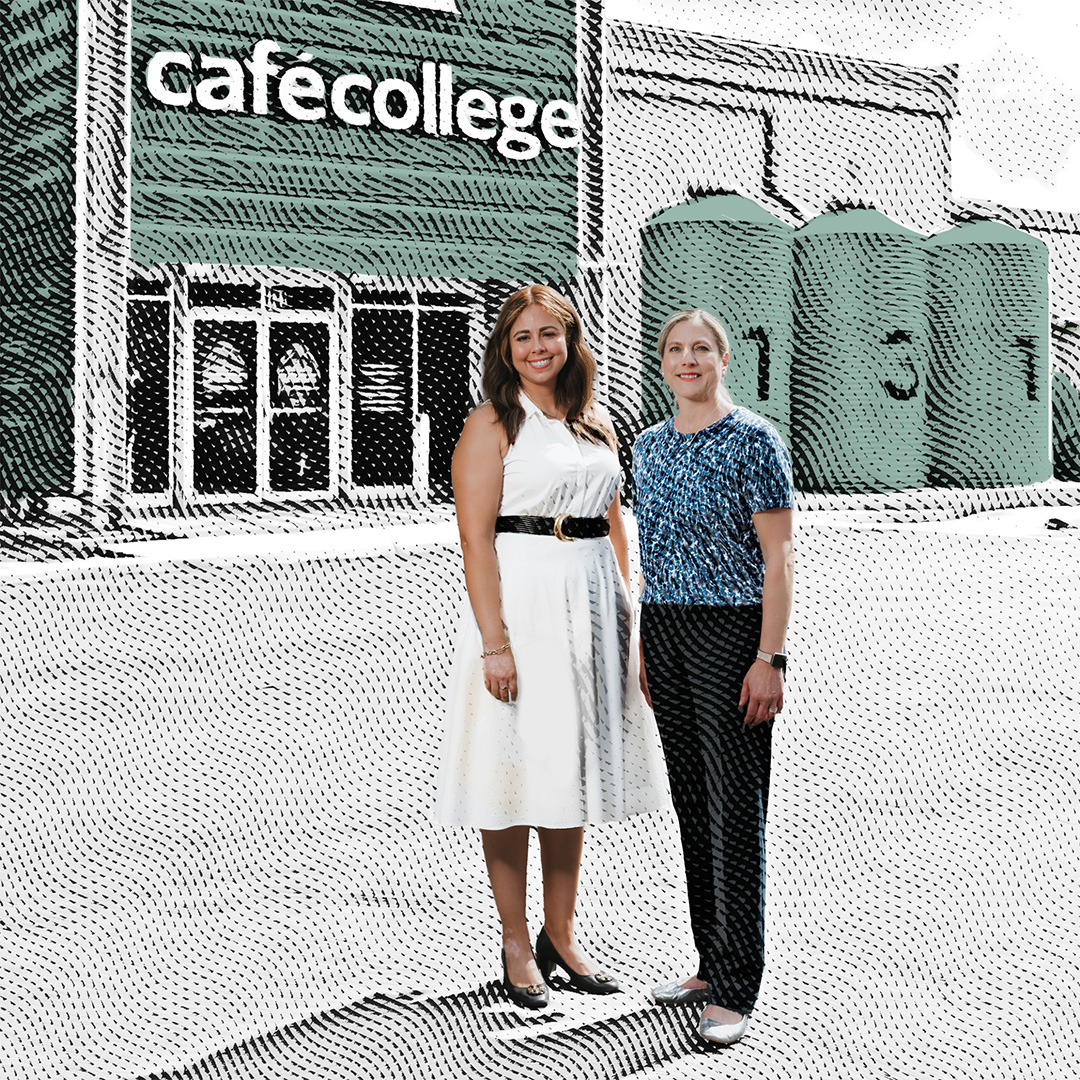
Dr. Vanessa Quiroga, executive director of Community Partnerships and Campus Visit Experience, serves on the board for the San Antonio Education Partnership (SAEP). The nonprofit helps youth and adults navigate their path to higher education through college advising, application assistance, SAT/ACT prep and financial aid guidance.
SAEP also awards scholarships to students enrolling at partner institutions—including A&M–San Antonio—helping remove financial barriers to college access.
“A&M-San Antonio’s mission closely aligns with SAEP’s work to create equitable pathways to college and career success,” Quiroga said. “Our shared impact is generational. When more students go to college and complete a degree, it doesn't just change one life. It strengthens the social fabric of our city. Investing in college opportunities is really investing in the future of San Antonio.”
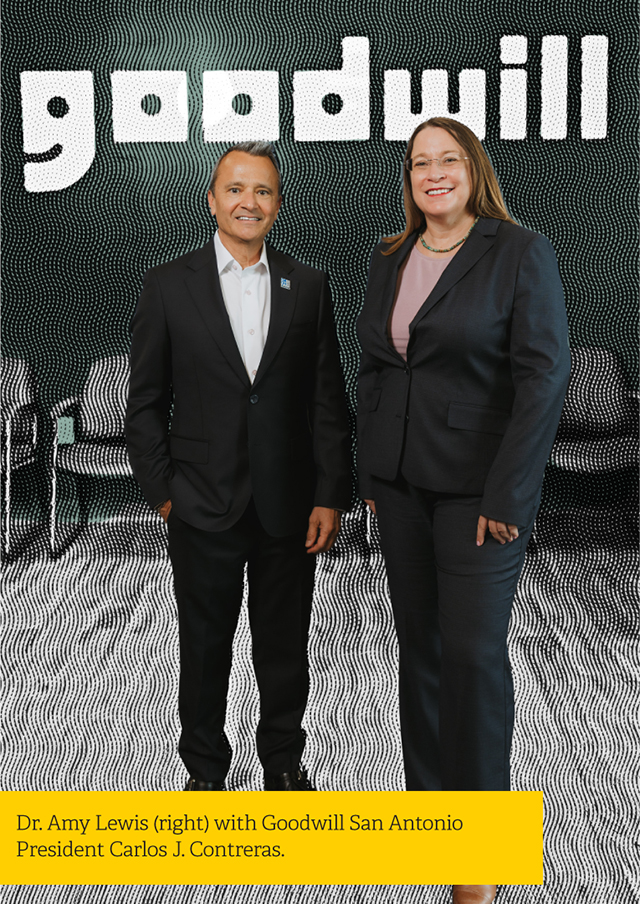
Dr. Amy Lewis, a professor of management and interim dean of the College of Business, has also made community service a cornerstone of her work. Since 2018, she has served on the Goodwill San Antonio Board of Directors.
While many associate Goodwill with its thrift stores, the organization’s true mission lies in workforce development. Goodwill helps individuals find meaningful employment through free career coaching, job training, vocational certifications and digital literacy programs—especially those transitioning from military service or facing barriers to employment. The nonprofit also provides guidance for youth by creating career or education plans. Lewis said these initiatives align closely with the University’s broader purpose.
“Our workforce development initiatives help some of our most vulnerable community members find a fast path to a living wage career,” said Lewis.
As a board member, Lewis said that over the years, her service has focused on different aspects of Goodwill’s mission, including advocating for living wage jobs, both for retail store employees and for the broader community. She is also serving on several Goodwill committees that are pursuing opening new retail store locations and training facilities, including in Boerne.
“One of the reasons I chose higher education as a vocation—and why I serve with nonprofits—is because I believe in empowering people to fulfill their potential. The University is located on the South Side for a reason, and that's to be a catalyst for this underserved part of San Antonio,” she said, adding that the University is an important neighborhood anchor, as real estate developers as well as companies like Toyota and TJ Maxx are investing in the area.
“We're starting to get the types of businesses that we need in order to support the South Side community,” she said.
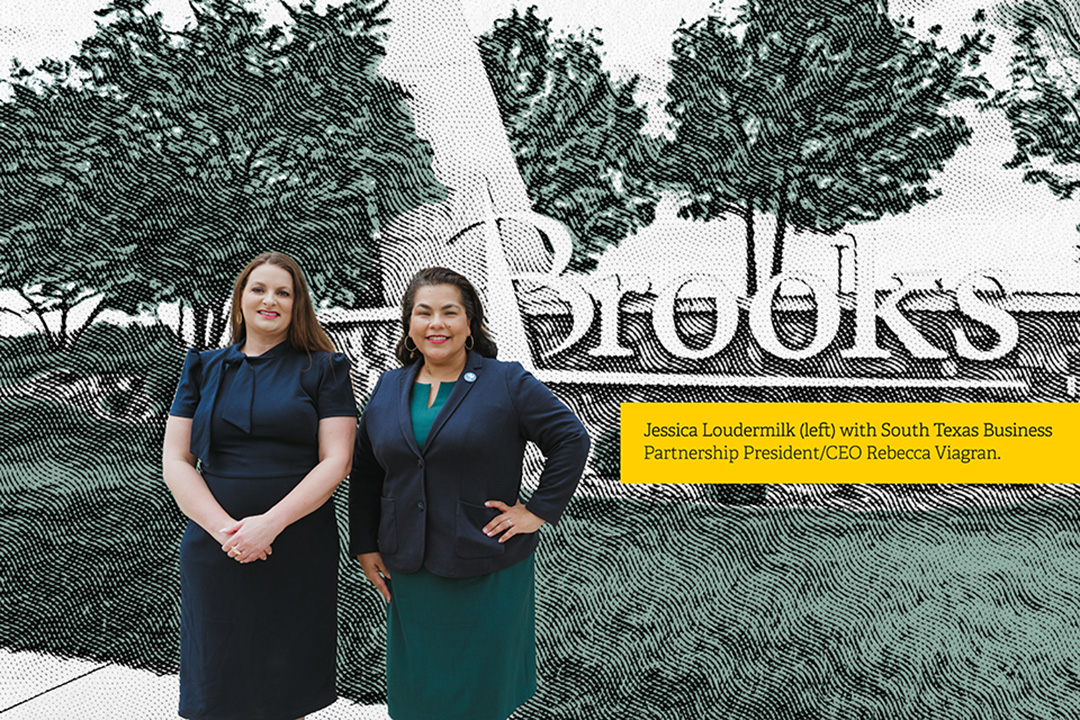
As chief of staff and vice president for strategic communications at A&M–San Antonio, Jessica Loudermilk is uniquely positioned to understand how the University’s achievements influence the region. Her perspective is further enriched by her role as chairwoman of the board for the South Texas Business Partnership (SoTX), where she partners with its President and CEO Rebecca Viagran. SoTX is an organization dedicated to bringing leaders together and promoting regional economic prosperity through advocacy and collaboration.
“While SoTX serves the business community, there’s a perfect alignment between my role on the board and my work at A&M-San Antonio, because what’s good for South Texas is good for the University, our students and their families,” said Loudermilk.
Under her leadership, the board’s theme for 2025 is “South Texas Renaissance,” which highlights the remarkable growth and development occurring in South San Antonio and more broadly, in South Texas.
“We wanted to counter the narrative that South San Antonio and South Texas are somehow problems to be solved,” Loudermilk said. “There is a lot to be celebrated—millions of dollars of investment in what has emerged as a region rich with opportunities.
"Looking in any direction from the campus, you see signs of development. The energy is palpable. And thats the case not only in South San Antonio, but in South Texas at large." ~Jessica Loudermilk
She points to new development and companies in the immediate vicinity of the University, including Toyota, JCB, the University Health hospital and medical complex being built, as well the expansive VIDA development off 410 on either side of University Way.
“Looking in any direction from the campus, you see signs of development. The energy is palpable. And that’s the case not only in South San Antonio, but in South Texas at large.”
Helping fuel that energy is the University, which Loudermilk says provides talent and skilled workers for area companies.
“The city, the state and the region need the University to grow to meet workforce needs of the very near future,” Loudermilk said. “It's critically important that we understand what industry needs and that we are ensuring that the students we're graduating are the students that they want to hire.”
Loudermilk identifies with the University’s student body, many of whom have overcome financial and personal obstacles to earn a degree when they are in their late-20s or older. She was the first member of her family to graduate from college – at age 29.
“We're really meeting a need for students that would otherwise not be met,” she said. "In its relatively short existence, A&M-San Antonio has made an enormous impact on the region and helped thousands of people become active and contributing members of the community.”
At its core, A&M–San Antonio’s growing economic footprint is powered by people—graduates who turn opportunity into enterprise, faculty who lead with purpose and staff who extend their expertise far beyond campus.
The University is not only educating students but also cultivating leaders, changemakers and collaborators. As it continues to evolve and expand its influence, A&M–San Antonio remains steadfast in shaping a brighter future for San Antonio and beyond, demonstrating that education and community engagement are pivotal to the region’s economic growth and success.
A&M–San Antonio’s Economic Footprint at a Glance
Here's how the University’s growing influence is creating powerful returns for students, taxpayers, and society:
$292.6 Million
Total economic contribution to Bexar County in FY 2022–23—nearly double the impact just four years prior.
$427 Million
Increased lifetime earnings for A&M–San Antonio graduates, powering regional prosperity.
3,242 Jobs Supported
A&M–San Antonio’s economic activity supports the equivalent of over 3,200 jobs across the region.
$68.8 Million Payroll
Employee earnings that are largely reinvested in the local economy through everyday spending and community engagement.
$190.8 Million in Public Return
For every dollar taxpayers invest, they receive $2.00 in benefits through added tax revenue and public sector savings.
$2.6 Billion in Social Benefit
Statewide, A&M–San Antonio generates substantial value by improving student outcomes and strengthening Texas’s economic base.

